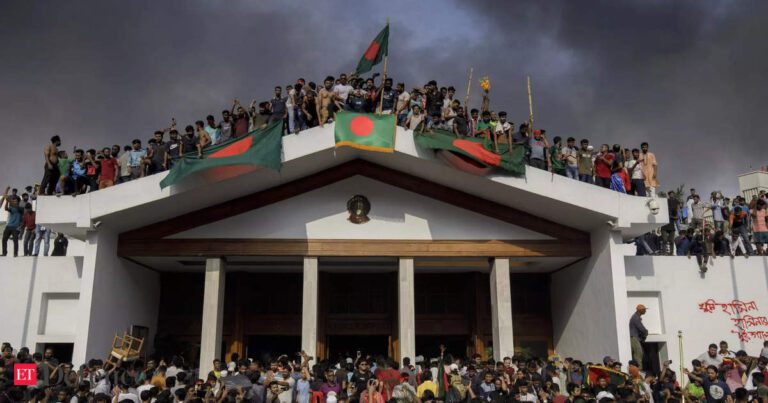“If I allowed a certain country to build an air base in Bangladesh, I would not have faced any problem,” Hasina was quoted as saying by the Daily Star Bangladesh. She did not name the country that had offered her the air base, but insisted that “the offer came from a white man.”
Asked about her response to the offer, the prime minister said she had given the same response she had given in 2001 when the US offered to sell the country's gas to India. “I have clearly said that I am the daughter of Father of the Nation Bangabandhu Sheikh Mujibur Rahman… We won the liberation war, I don't want to come to power by leasing or handing over a part of the country to another country, I don't need power,” she said.
At the time, many thought Hasina was talking about the United States. But the sudden coup made everyone believe that the United States had engineered the overthrow of Hasina’s elected government and its replacement with a government of her own. Hasina’s relations with the United States have long been strained. The United States, Bangladesh’s biggest export buyer, has become more vocal in its calls for free and fair elections, imposing visa restrictions on several members of Hasina’s ruling party and military officials in September.
After fleeing to India, Hasina again claimed that the United States had played a role in her overthrow. “I could have stayed in power if I had surrendered sovereignty over Saint Martin and allowed America to dominate the Bay of Bengal,” she said.
But the United States has rejected allegations of involvement in the Bangladesh crisis, including the protests in the country that have killed hundreds of people. At a press briefing a week after the coup, White House spokeswoman Karine Jean-Pierre dismissed all reports and rumors, saying: “So we had absolutely no involvement. Any reports or rumors that the United States government was involved in these events are simply false. That is not true.” Jean-Pierre added: “That is a choice for the Bangladeshi people. We believe that the Bangladeshi people should determine the future of the Bangladeshi government, and that is our position. We will certainly continue to say any allegations, and what I said here is absolutely not true.”
The United States may not have had any role in the coup against Hasina and the formation of an interim government, but Bangladesh has tremendous strategic value to the United States, and a more cooperative government than Hasina’s could better serve American strategic interests in the region.
In June last year, Hasina alleged that the US was planning to acquire the island of Saint Martin to build a military base in exchange for the opposition BNP winning the elections. She alleged that the BNP, if it came to power, would sell the island to the US, a move she has vowed never to allow while in office.
Although the US has rejected its demands, a US military foothold in Bangladesh would put it in a strong position against China. An article published by the US Naval Institute, an independent, non-profit forum, detailed Bangladesh’s military importance to the US, arguing that the country could serve as a key logistics node for the US Navy or assist in blockade operations that support the US Navy’s broader objectives in the Indo-Pacific region.
“By cooperating with the Bangladesh Navy, the US Navy can use these bases to monitor Chinese projects,” says the article, written by researchers from Bangladesh. “Moreover, Bangladesh’s strategic location at the top of the Bay of Bengal could provide the US with an advantage in guarding the Strait of Malacca, which is vital to the Chinese economy and industry.”
The article says that while Bangladesh's position on Indo-Pacific security “is consistent with the rules-based order that the US Navy seeks to impose, the lack of clear alignment and the absence of a synchronized maritime strategy and doctrinal documents reveal a slow-moving, risk-averse strategy.”
“Lack of access to Western platforms and funding is what has led Bangladesh to acquire submarines from China,” the article says. “If adequate funding, technology and support for the platforms are provided, Bangladesh could be a potential candidate for modern Western conventional diesel-powered attack submarines.”
The article says that since the US has no bases in the Bay of Bengal, during any potential conflict, naval bases in Bangladesh could serve as a logistics hub and safe haven for the US Navy.
“Bangladesh is currently building a deep-sea port at Matarbari, Cox’s Bazar, with the help of Japan, one of the United States’ most trusted and important allies since World War II. Japan could help build a bridge between these two countries to ensure that the U.S. Navy can use the Matarbari deep-sea port as a naval base during any future war by blocking potential Chinese shipping bypassing Malacca to use the China-Myanmar Economic Corridor as an alternative. This would provide the United States with leverage against China in the Bay of Bengal region,” the article said.
The article also says that Bangladesh could provide the US with long-term intelligence, surveillance and reconnaissance advantages over China.
